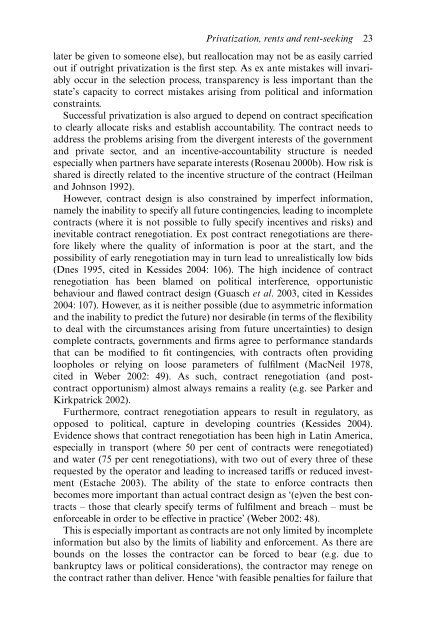PRIVATIZATION Privatization in Malaysia, Regulation, rent-seeking and policy failure
PRIVATIZATION Privatization in Malaysia, Regulation, rent-seeking and policy failure
PRIVATIZATION Privatization in Malaysia, Regulation, rent-seeking and policy failure
You also want an ePaper? Increase the reach of your titles
YUMPU automatically turns print PDFs into web optimized ePapers that Google loves.
<strong>Privatization</strong>, <strong>rent</strong>s <strong>and</strong> <strong>rent</strong>-seek<strong>in</strong>g 23later be given to someone else), but reallocation may not be as easily carriedout if outright privatization is the first step. As ex ante mistakes will <strong>in</strong>variablyoccur <strong>in</strong> the selection process, transparency is less important than thestate’s capacity to correct mistakes aris<strong>in</strong>g from political <strong>and</strong> <strong>in</strong>formationconstra<strong>in</strong>ts.Successful privatization is also argued to depend on contract specificationto clearly allocate risks <strong>and</strong> establish accountability. The contract needs toaddress the problems aris<strong>in</strong>g from the divergent <strong>in</strong>terests of the government<strong>and</strong> private sector, <strong>and</strong> an <strong>in</strong>centive-accountability structure is neededespecially when partners have separate <strong>in</strong>terests (Rosenau 2000b). How risk isshared is directly related to the <strong>in</strong>centive structure of the contract (Heilman<strong>and</strong> Johnson 1992).However, contract design is also constra<strong>in</strong>ed by imperfect <strong>in</strong>formation,namely the <strong>in</strong>ability to specify all future cont<strong>in</strong>gencies, lead<strong>in</strong>g to <strong>in</strong>completecontracts (where it is not possible to fully specify <strong>in</strong>centives <strong>and</strong> risks) <strong>and</strong><strong>in</strong>evitable contract renegotiation. Ex post contract renegotiations are thereforelikely where the quality of <strong>in</strong>formation is poor at the start, <strong>and</strong> thepossibility of early renegotiation may <strong>in</strong> turn lead to unrealistically low bids(Dnes 1995, cited <strong>in</strong> Kessides 2004: 106). The high <strong>in</strong>cidence of contractrenegotiation has been blamed on political <strong>in</strong>terference, opportunisticbehaviour <strong>and</strong> flawed contract design (Guasch et al. 2003, cited <strong>in</strong> Kessides2004: 107). However, as it is neither possible (due to asymmetric <strong>in</strong>formation<strong>and</strong> the <strong>in</strong>ability to predict the future) nor desirable (<strong>in</strong> terms of the flexibilityto deal with the circumstances aris<strong>in</strong>g from future uncerta<strong>in</strong>ties) to designcomplete contracts, governments <strong>and</strong> firms agree to performance st<strong>and</strong>ardsthat can be modified to fit cont<strong>in</strong>gencies, with contracts often provid<strong>in</strong>gloopholes or rely<strong>in</strong>g on loose parameters of fulfilment (MacNeil 1978,cited <strong>in</strong> Weber 2002: 49). As such, contract renegotiation (<strong>and</strong> postcontractopportunism) almost always rema<strong>in</strong>s a reality (e.g. see Parker <strong>and</strong>Kirkpatrick 2002).Furthermore, contract renegotiation appears to result <strong>in</strong> regulatory, asopposed to political, capture <strong>in</strong> develop<strong>in</strong>g countries (Kessides 2004).Evidence shows that contract renegotiation has been high <strong>in</strong> Lat<strong>in</strong> America,especially <strong>in</strong> transport (where 50 per cent of contracts were renegotiated)<strong>and</strong> water (75 per cent renegotiations), with two out of every three of theserequested by the operator <strong>and</strong> lead<strong>in</strong>g to <strong>in</strong>creased tariffs or reduced <strong>in</strong>vestment(Estache 2003). The ability of the state to enforce contracts thenbecomes more important than actual contract design as ‘(e)ven the best contracts– those that clearly specify terms of fulfilment <strong>and</strong> breach – must beenforceable <strong>in</strong> order to be effective <strong>in</strong> practice’ (Weber 2002: 48).This is especially important as contracts are not only limited by <strong>in</strong>complete<strong>in</strong>formation but also by the limits of liability <strong>and</strong> enforcement. As there arebounds on the losses the contractor can be forced to bear (e.g. due tobankruptcy laws or political considerations), the contractor may renege onthe contract rather than deliver. Hence ‘with feasible penalties for <strong>failure</strong> that


